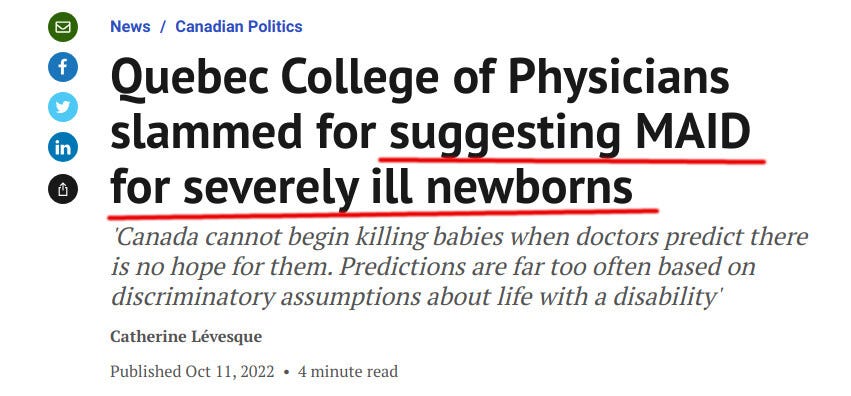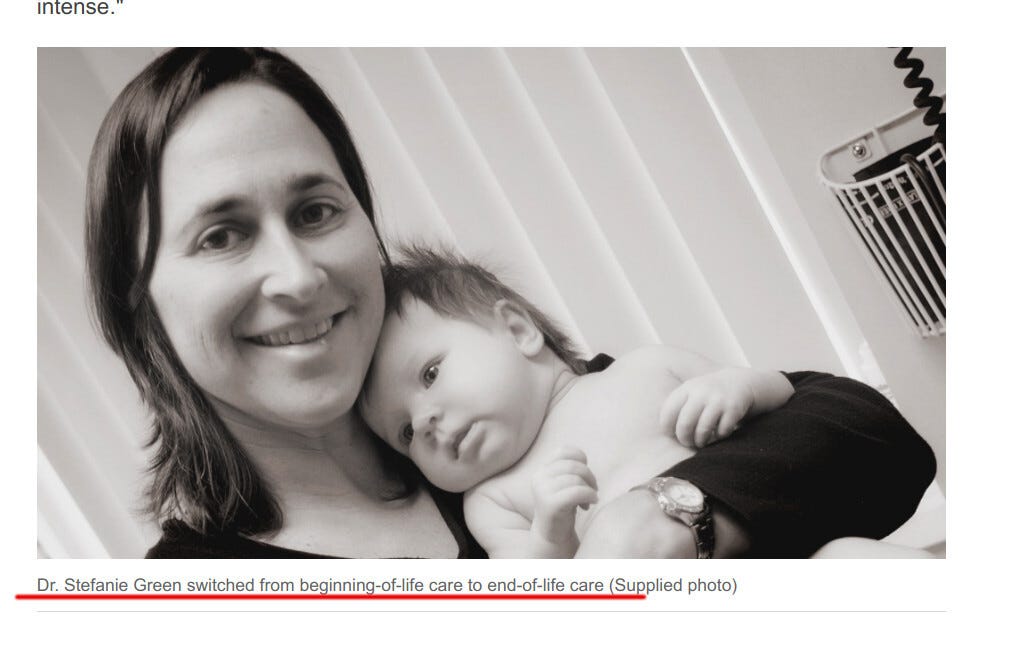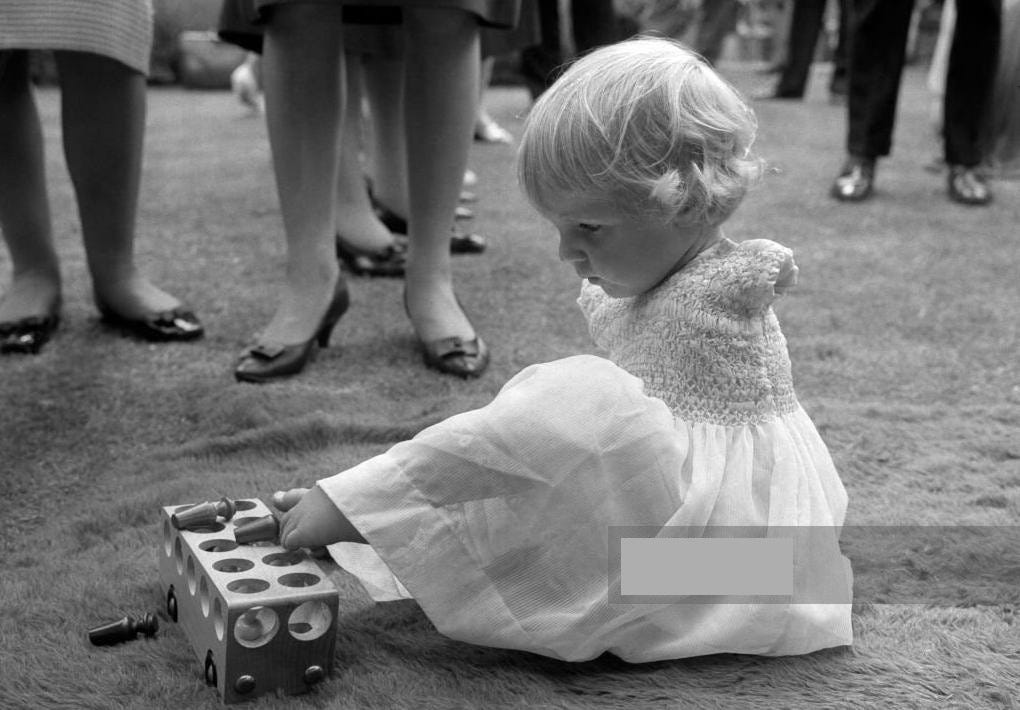Assisted Suicide for BABIES Demanded by Quebec College of Physicians
Canadian MAiD Program to Expand Dramatically
I apologize for using the oxymoronic term “assisted suicide for babies” in the title. An infant is not self-aware and cannot “commit suicide.” Infants want to live, eat, and be held by their parents. And yet, the Quebec College of Physicians wants to expand the Canadian “Medical Assistance in Dying” program to infants.
Watch Dr. Louis Roy, from the Quebec College of Physicians, telling the Commons' Special Joint Committee of Medical Assistance in Dying (MAID) on Oct. 7 that his organization believes MAID can be appropriate for infants up to age one who are born with “severe malformations.”
Medical Assistance in Dying implies someone wanting to die and getting medical assistance to die in a socially approved manner with some comfort.
Infants under one year cannot possibly choose to die or request medical assistance, so the name does not exactly suit the situation. Instead of “assistance in dying,” infants will be euthanized for the convenience of the parents and doctors who no longer want to deal with problematic babies. There are other, even more disturbing reasons for this program being promoted, which we will explore.
Canada’s National Post has the details.

Quebec’s College of Physicians proposal attempts to sound sensible by referring to babies who suffer from “unbearable pain,” with euthanasia approved by a doctor and consented to by both parents. I am unsure how custodial situations would be handled and suspect that “both parents’ consent” would be disregarded in the case of non-married parents.
However, we must ask: how do we know that a baby’s pain is unbearable? We cannot ask the baby, after all. As a father of two grown children, I remember them suffering from routine illnesses where their pain seemed “unbearable.” My heart was breaking for them as they cried for hours over stomach pains and other issues, usually at night. While such pains felt desperately “unbearable” at the moment, they were temporary; fortunately, both kids grew up just fine. I learned that what seems unbearable in one moment may eventually become a distant memory.
The Quebec College of Physicians does not realize that and thinks adults can decide which infants to euthanize.
Some Physicians Love MAiD
A supposed “safeguard” requires a physician’s approval in any decision to euthanize infants. Will it protect infants from ill-considered euthanasia decisions?
Not necessarily. Consider Dr. Green, a MAiD enthusiast who loves providing and advocates for euthanasia. Dr. Green has already euthanized over 300 people, and she loves her job!
She is pictured here, holding an uncomfortable-looking infant:

When Medical Assistance in Dying, dubbed MAiD, became legal in Canada in 2016, Dr. Green was exhausted from 20 years of doing maternity work and was looking for a change.
So, she switched from beginning-of-life care to end-of-life care.
"One's a delivery in. One's a delivery out," said Dr. Green. "They're similar in terms of they're both incredibly intimate moments. They're milestones in someone's life. They are intense."
Dr. Green has helped some 300 people die in the last five years and says she doesn't feel burned out. Quite the opposite.
Dr. Stefanie Green found her calling and is not feeling burned out - quite the opposite - experiencing intense emotions administering euthanasia to her patients.
What are the chances that doctors such as Dr. Green, who love the intense emotions they experience from euthanasing people, would safeguard the lives of infants? You tell me.
Organ Harvesting
The infants who will be euthanized by the likes of Dr. Stefanie Green are not considered valuable enough to live. However, they have valuable organs that could be harvested and given to more deserving children.
While euthanasia is not a well-paying procedure, performed often by enthusiast doctors like Dr. Green, who experience intense emotions that they value, organ transplantation is a thriving and big-money business benefiting doctors, surgeons, and hospitals.
Organs do save lives. I get that. But does the opportunity to harvest organs from an infant who cannot object to his or her euthanasia present ethical problems? Is there an unsolvable conflict of interest? Yes, in my opinion.
If tired parents of a sickly child, exhausted from sleepless nights and medical expenses, visit a doctor like Stefanie Green, I expect that MAiD euthanasia will likely be approved and quickly performed.
The parents may initially feel relieved. The hospital performing the euthanasia will make money on harvested organs. In the future, though, the parents may have more sleepless nights full of bad dreams about their euthanized baby that they agreed to kill.
So, we have to ask, can we judge an infant and say with certainty that this infant deserves to die due to their sickness? How do we know which infants are hopeless?
Do you know anyone who was born very sick and with health problems who then went on to live a productive life? Would we be better off if the thalidomide-affected child pictured below was euthanized?




They already do this in America on the down-low without parental consent. I have a child with spins bifida. Me and the other mom have stories of being denied needed care because the doctors feel our children don’t have a high quality of life. Too many deadly medical errors by these same doctors. I was told by a nurse to take my child and run. My baby was diagnosed as terminal but she just turned 5 and she’s doing great because I fought to get her the care she needed.
Nope. A baby cannot decide. That’s murder.